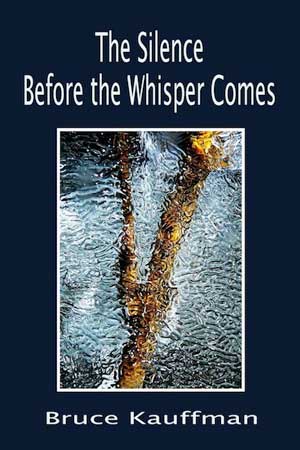Why would anyone write poetry? It’s not what you’d call glamourous. You’re never going to make money at it. The best you can hope for is if you manage to publish a few books of poems you could possibly get picked up by some university to teach a creative writing class or get some work editing for literary magazines. The best poets I’ve known or read have jobs working in book stores and coffee shops in order to pay the bills. Yet, still they continue to write and produce poetry which only, perhaps, a few hundred people will ever read. Why?

One of the latter is Kingston Ontario Canada resident Bruce Kauffman. His latest book of poetry, The Silence Before the Whisper Comes, published by Hidden Brook Press, is the third of his books which I’ve reviewed, and while I have to admit to a certain amount of chauvinism as we share the same city of residence, he has to rank among the top living poets I’ve had the privilege of reading. While poetry, like all art, is highly subjective in its appreciation, Kauffman’s work transcends anything so trivial as its readers likes or dislikes. Like the natural world it quite often alludes to it simply is, awaiting the discerning eye to glance upon it and appreciate the qualities which quantify its existence.
Attempting to interpret another’s poetry is often a perilous journey fraught with the minefields of our own prejudices and preconceptions. We can only guess at what somebody was trying to say through the filter of our own beliefs. However, in the case of the gifted poets, no matter whether they use metaphor or analogy, the words on the page do more than simply express some thought or idea. Instead of seeking some hidden meaning within the language, listen to the effect the accumulated words have on you emotionally. A poem should be the perfect marriage of heart and mind, the latter transcribing for the former to articulate its inner workings without loading it with extraneous baggage or complications.
Kauffman’s work in this book is as good an example of a poet bringing that union to life on the page as you’re likely to find anywhere. While his poems are full to the brim with ideas and thought, there’s no wading through tortured intellectual process to enter the emotional core of the matter. At the same time, he doesn’t spell anything out for you allowing the reader to follow their own process until they reach a conclusion. You never once feel like you’re being either led by the nose to see the author’s point of view or made so confused you literally can’t see the forest for the trees.
Considering Kauffman’s use of the natural world in his poems as a means of expressing his opinions on the world around him, I guess that’s a bit ironic. However, there’s also a great deal of truth in it. For while some tend to try and overload their poems with imagery or ideas Kauffman’s work reminds us of the beauty of simplicity. Instead of gushing forth a torrent of words in order to impress us with his emotional depth, Kauffman manages to find a way of communicating without overwhelming us. Whether intentional or not, his work is a perfect example of the credo less is more.

I’m reluctant to quote from any of his poems in this review, because the words taken out of their overall context will lose their meaning. Even when scouring the longer poems, and some of them do stretch over a number of pages, I find it hard to remove a segment as an example of Kauffman’s work. The words feel orphaned when separated from their main body. It would be like showing you an amputated limb and trying to tell you what the rest of the body looks like. Could you tell what a painting looked like if someone cut out a small section from the outer edge, or even the middle? You might get some idea of the artist’s technique, but you’d still be none the wiser as to the paintings overall appearance. However, at the conclusion of this review I’ve included a copy of one poem, hoping that it will give you some indication as to the quality of his work.
It’s easy enough to write a poem. What’s difficult is writing a poem which offers its readers a chance to experience the world in ways they never would have thought of on their own. Most poets are content with offering you glimpses into their own lives or showing you their reflections in the mirror of their paper. Bruce Kauffman is one of those rare poets who turns his vision outward and then reflects it back onto the page for us to bear witness. This is not only the work of a gifted writer, but of a gifted artist. The Silence Before the Whisper Comes can be purchased from most online book retailers.
blue rain
(by Bruce Kauffman The Silence Before the Whisper Comes Hidden Brook Press 2013 pg.28)with this page before me waiting to catch moisture there are times when words no longer freely fall from an ordinary sky and on those days i take the lavender bowl to the barrel beneath the corner eve of the house i draw from barrel's surface the wet words floating there then with tongs dripping black ink i separate and pull words from the bowl and place them gently on a page they content to be there but their heart is still floating in yesterday's sky





Leave a Reply